
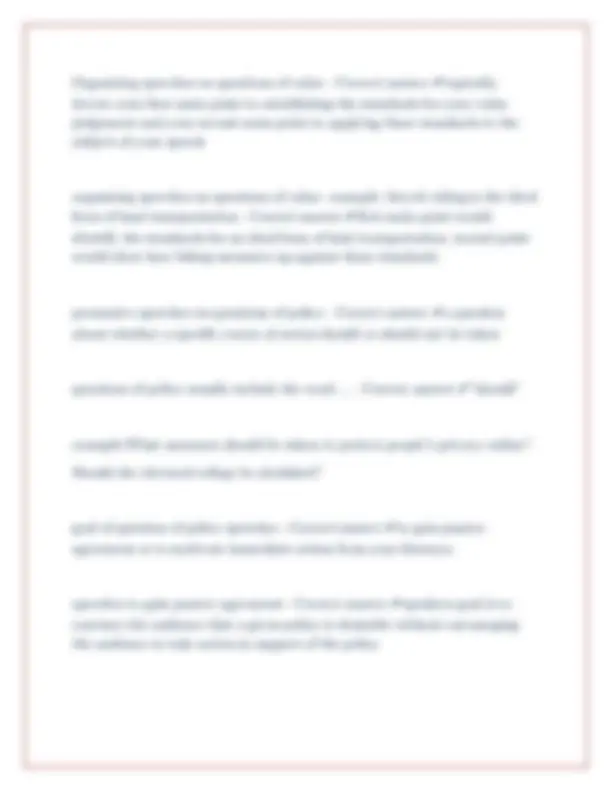
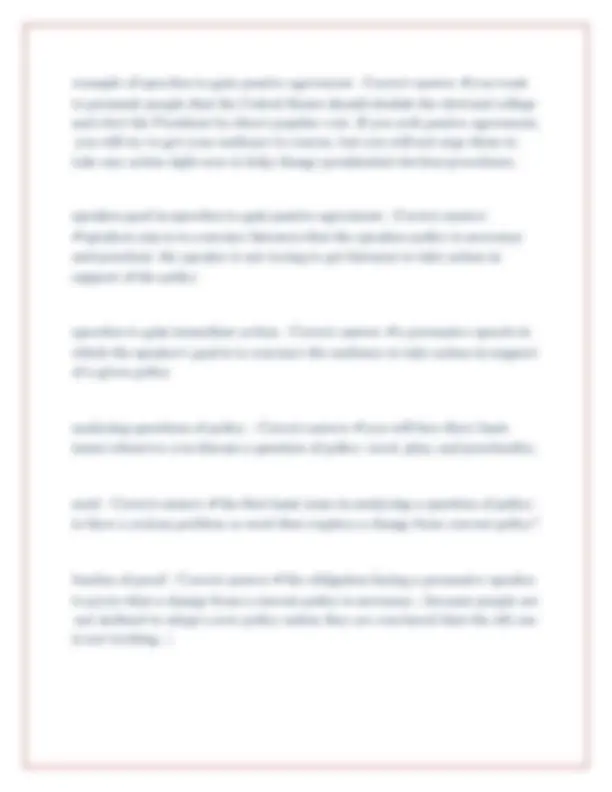
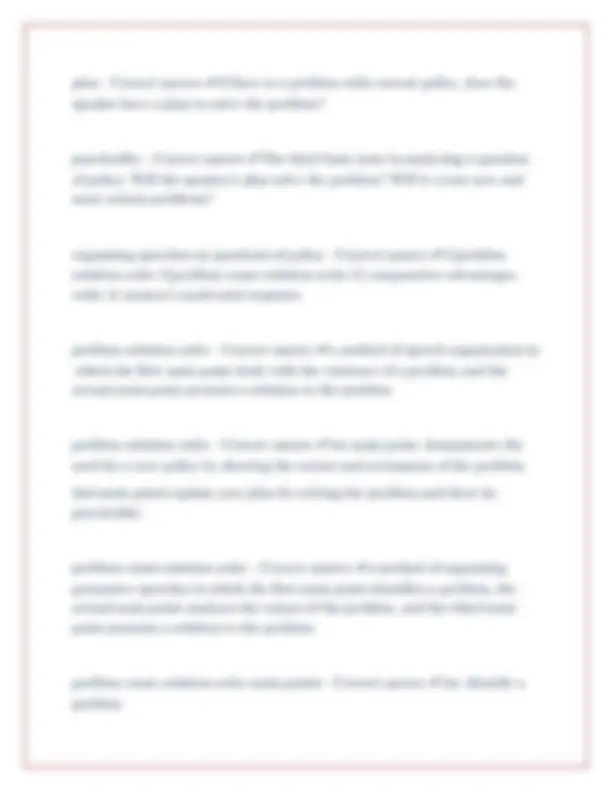
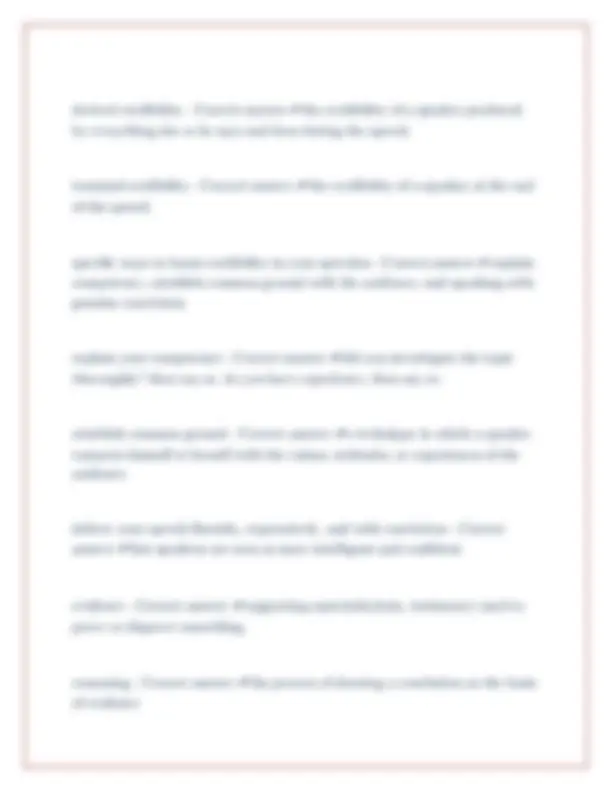
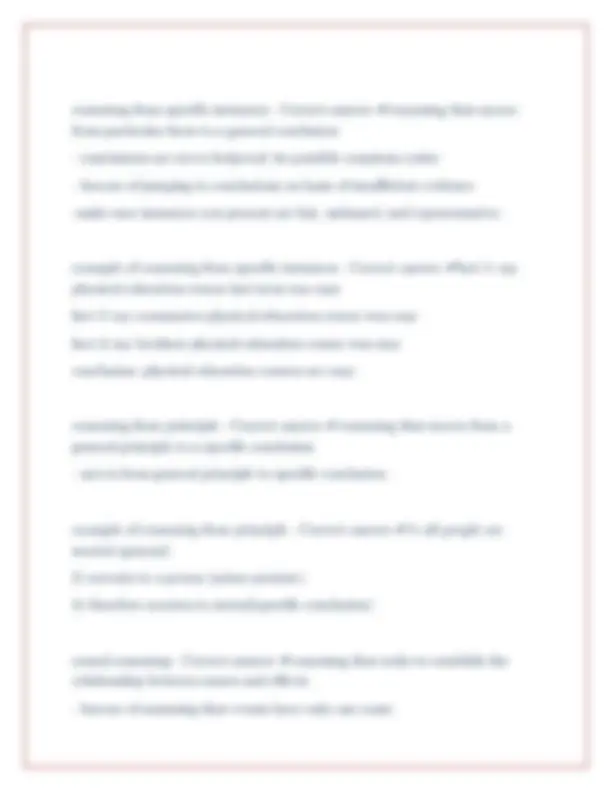
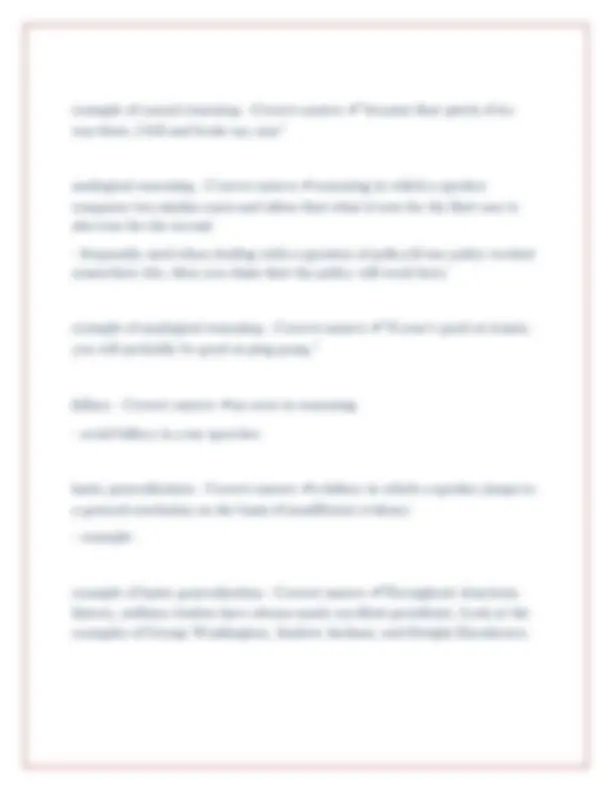
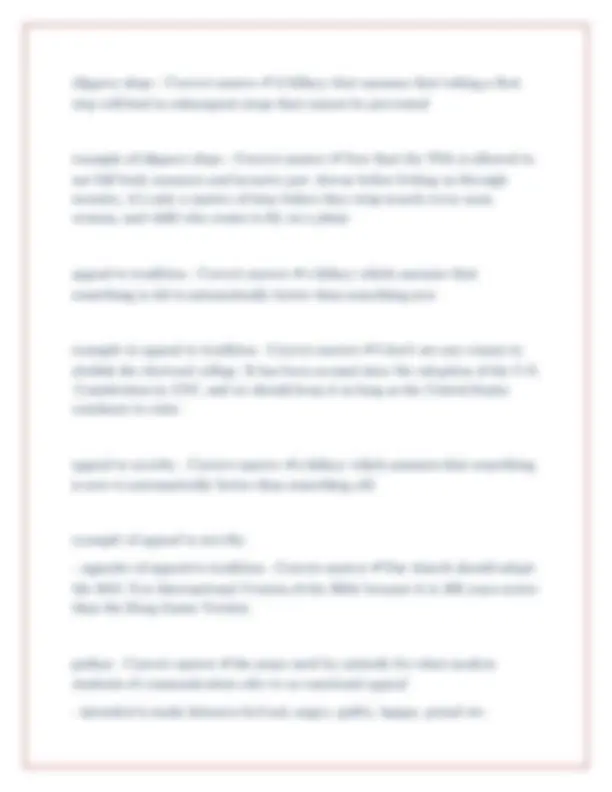
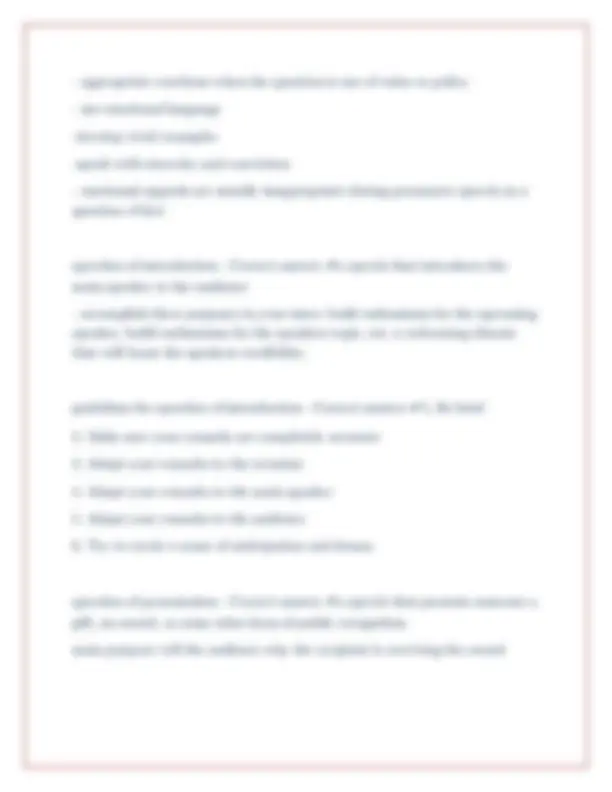
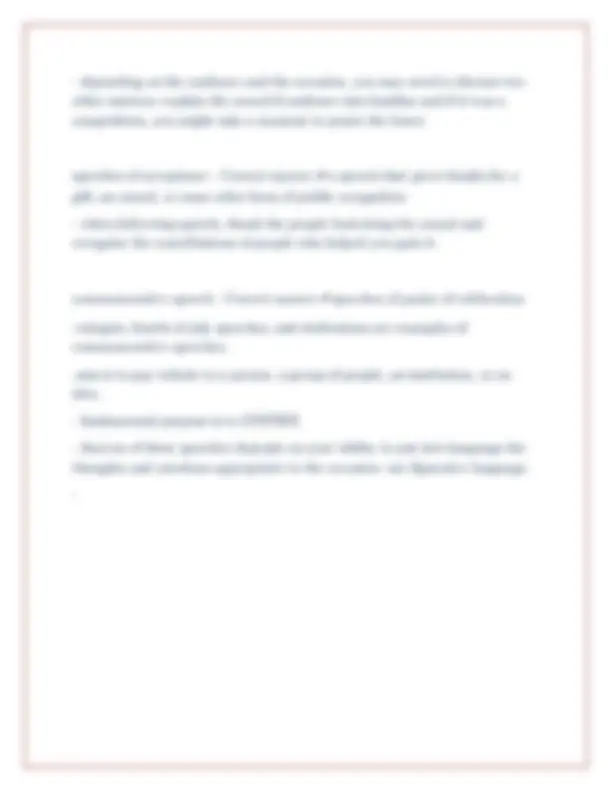


Study with the several resources on Docsity

Earn points by helping other students or get them with a premium plan


Prepare for your exams
Study with the several resources on Docsity

Earn points to download
Earn points by helping other students or get them with a premium plan
Community
Ask the community for help and clear up your study doubts
Discover the best universities in your country according to Docsity users
Free resources
Download our free guides on studying techniques, anxiety management strategies, and thesis advice from Docsity tutors
A comprehensive overview of persuasion, covering definitions, key concepts, and strategies for effective persuasive speaking. It explores various aspects of persuasion, including tailoring messages to audiences, understanding mental dialogues, and addressing objections. The material also delves into different types of persuasive speeches, such as those focusing on questions of fact, value, and policy, offering insights into organizing and delivering impactful presentations. Useful for students studying communication, rhetoric, or public speaking, offering a structured approach to mastering the art of persuasion. (410 characters)
Typology: Exams
1 / 15

This page cannot be seen from the preview
Don't miss anything!










Persuasion | definition | - | Correct | answer | ✔the | process | of | creating, | reinforcing, | or | changing | people's | beliefs | or | actions persuasion | - | Correct | answer | ✔persuasion | involves | any | movement | by | a | listener | from | left | to | right | on | the | scale, | no | matter | where | the | listener | begins | and | no | matter | how | great | or | small | the | movement. successful | persuasive | speech | - | Correct | answer | ✔will | depend | on | how | well | you | tailor | your | message | to | the | values, | attitudes, | and | beliefs | of | your | audience. persuasion | is | - | Correct | answer | ✔something | a | speaker | does | with | an | audience. | the | listener | engages | in | a | mental | give-and-take | with | the | speaker. | while | they | listen | they | asses | the | speakers | credibility, | delivery, | supporting | materials, | language, | reasoning, | and | emotional | appeals. degrees | of | persuasion | - | Correct | answer | ✔ target | audience | - | Correct | answer | ✔no | matter | what | the | situation, | a | persuasive | speaker | needs | to | adapt | to | the | target | audience. | -the | portion | of | the | whole | audience | that | the | speaker | most | wants | to | persuade
persuasive | speech | is | a | kind | of | mental | dialogue | - | Correct | answer | ✔you | must | anticipate | possible | objections | the | audience | will | raise | to | your | point | of | view | and | answer | them | in | your | speech. | you | cannot | convert | skeptical | listeners | unless | you | deal | directly | with | the | reasons | for | their | skepticism mental | dialogue | with | the | audience | - | Correct | answer | ✔the | mental | give-and- take | between | speaker | and | listener | during | a | persuasive | speech persuasive | speeches | on | questions | of | fact | - | Correct | answer | ✔a | question | about | the | truth | or | falsity | of | an | assertion situation | for | a | persuasive | speech | on | a | question | of | fact | is | - | Correct | answer | ✔partisan. | the | speaker | acts | as | an | advocate. organizing | speeches | on | question | of | fact | - | Correct | answer | ✔organized | topically. | -each | main | point | in | your | speech | will | present | a | reason | why | someone | should | agree | with | you. persuasive | speeches | on | questions | of | value | - | Correct | answer | ✔a | question | about | the | worth, | rightness, | morality, | and | so | forth | of | an | idea | or | action value | judgements | - | Correct | answer | ✔judgements | based | on | a | person's | belief's | about | what | is | right | or | wrong, | good | or | bad, | moral | or | immoral, | proper | or | improper, | fair | or | unfair.
example | of | speeches | to | gain | passive | agreement | - | Correct | answer | ✔you | want | to | persuade | people | that | the | United | States | should | abolish | the | electoral | college | and | elect | the | President | by | direct | popular | vote. | If | you | seek | passive | agreement, | you | will | try | to | get | your | audience | to | concur, | but | you | will | not | urge | them | to | take | any | action | right | now | to | help | change | presidential | election | procedures. speakers | goal | in | speeches | to | gain | passive | agreement | - | Correct | answer | ✔speakers | aim | is | to | convince | listeners | that | the | speakers | policy | is | neccessay | and | practical. | the | speaker | is | not | trying | to | get | listeners | to | take | action | in | support | of | the | policy speeches | to | gain | immediate | action | - | Correct | answer | ✔a | persuasive | speech | in | which | the | speaker's | goal | is | to | convince | the | audience | to | take | action | in | support | of | a | given | policy analyzing | questions | of | policy | - | Correct | answer | ✔you | will | face | three | basic | issues | whenever | you | discuss | a | question | of | policy- | need, | plan, | and | practicality. need | - | Correct | answer | ✔the | first | basic | issue | in | analyzing | a | question | of | policy: | is | there | a | serious | problem | or | need | that | requires | a | change | from | current | policy? burden | of | proof | - | Correct | answer | ✔the | obligation | facing | a | persuasive | speaker | to | prove | that | a | change | from | a | current | policy | is | necessary. | (because | people | are | not | inclined | to | adopt | a | new | policy | unless | they | are | convinced | that | the | old | one | is | not | working. | )
plan | - | Correct | answer | ✔if | there | is | a | problem | with | current | policy, | does | the | speaker | have | a | plan | to | solve | the | problem? practicality | - | Correct | answer | ✔The | third | basic | issue | in | analyzing | a | question | of | policy: | Will | the | speaker's | plan | solve | the | problem? | Will | it | create | new | and | more | serious | problems? organizing | speeches | on | questions | of | policy | - | Correct | answer | ✔1)problem | solution | order | 2)problem-cause-solution | order | 3) | comparative | advantages | order | 4) | monroe's | motivated | sequence problem | solution | order | - | Correct | answer | ✔a | method | of | speech | organization | in | which | the | first | main | point | deals | with | the | existence | of | a | problem | and | the | second | main | point | presents | a | solution | to | the | problem problem | solution | order | - | Correct | answer | ✔1st | main | point: | demonstrate | the | need | for | a | new | policy | by | showing | the | extent | and | seriousness | of | the | problem 2nd | main | point:explain | your | plan | for | solving | the | problem | and | show | its | practicality. problem-cause-solution | order | - | Correct | answer | ✔a | method | of | organizing | persuasive | speeches | in | which | the | first | main | point | identifies | a | problem, | the | second | main | point | analyzes | the | causes | of | the | problem, | and | the | third | main | point | presents | a | solution | to | the | problem problem | cause | solution | order | main | points | - | Correct | answer | ✔1st: | identify | a | problem
Visualization | - | Correct | answer | ✔The | key | to | this | step | is | using | vivid | imagery | to | show | your | listeners | how | they | will | profit | from | your | policy. | Make | them | see | how | much | better | conditions | will | be | once | your | plan | is | adopted. .Action | - | Correct | answer | ✔Once | the | audience | is | convinced | that | your | policy | is | beneficial, | you | are | ready | to | call | for | action. | Say | exactly | what | you | want | the | audience | to | do—and | how | to | do | it. | Then | conclude | with | a | final | stirring | appeal | that | reinforces | their | commitment | to | act. ethos | - | Correct | answer | ✔the | name | used | by | Aristotle | for | what | modern | students | of | communication | refer | to | as | credibility what | two | factors | affects | credibility |? | - | Correct | answer | ✔competence | and | character competence | - | Correct | answer | ✔how | an | audience | regards | a | speakers | intelligence, | expertise | and | knowledge | of | the | subject character | - | Correct | answer | ✔how | an | audience | regards | a | speaker's | sincerity, | trustworthiness, | and | concern | for | the | well-being | of | an | audience credibility | - | Correct | answer | ✔the | audience's | perception | of | whether | a | speaker | is | qualified | to | speak | on | a | given | topic initial | credibility | - | Correct | answer | ✔the | credibility | of | a | speaker | before | she | or | he | starts | to | speak
derived | credibility | - | Correct | answer | ✔the | credibility | of | a | speaker | produced | by | everything | she | or | he | says | and | does | during | the | speech terminal | credibility | - | Correct | answer | ✔the | credibility | of | a | speaker | at | the | end | of | the | speech specific | ways | to | boost | credibility | in | your | speeches | - | Correct | answer | ✔explain | competence, | establish | common | ground | with | the | audience, | and | speaking | with | genuine | conviction explain | your | competence | - | Correct | answer | ✔did | you | investigate | the | topic | thoroughly? | then | say | so. | do | you | have | experience, | then | say | so. establish | common | ground | - | Correct | answer | ✔a | technique | in | which | a | speaker | connects | himself | or | herself | with | the | values, | attitudes, | or | experiences | of | the | audience. deliver | your | speech | fluently, | expressively, | and | with | conviction | - | Correct | answer | ✔fast | speakers | are | seen | as | more | intelligent | and | confident. evidence | - | Correct | answer | ✔supporting | materials(stats, | testimony) | used | to | prove | or | disprove | something. reasoning | - | Correct | answer | ✔the | process | of | drawing | a | conclusion | on | the | basis | of | evidence
example | of | causal | reasoning | - | Correct | answer | ✔"because | that | patch | of | ice | was | there, | I | fell | and | broke | my | arm" analogical | reasoning | - | Correct | answer | ✔reasoning | in | which | a | speaker | compares | two | similar | cases | and | infers | that | what | is | true | for | the | first | case | is | also | true | for | the | second
false | cause | ( | post | hoc, | ergo | propter | hoc: | "after | this, | therefore | because | of | this" |
red | herring | - | Correct | answer | ✔a | fallacy | that | introduces | an | irrelevant | issue | to | divert | attention | from | the | subject | under | discussion
slippery | slope | - | Correct | answer | ✔A | fallacy | that | assumes | that | taking | a | first | step | will | lead | to | subsequent | steps | that | cannot | be | prevented example | of | slippery | slope | - | Correct | answer | ✔Now | that | the | TSA | is | allowed | to | use | full | body | scanners | and | invasive | pat- | downs | before | letting | us | through | security, | it's | only | a | matter | of | time | before | they | strip-search | every | man, | woman, | and | child | who | wants | to | fly | on | a | plane. appeal | to | tradition | - | Correct | answer | ✔a | fallacy | which | assumes | that | something | is | old | is | automatically | better | than | something | new example | to | appeal | to | tradition | - | Correct | answer | ✔I | don't | see | any | reason | to | abolish | the | electoral | college. | It | has | been | around | since | the | adoption | of | the | U.S. | Constitution | in | 1787, | and | we | should | keep | it | as | long | as | the | United | States | continues | to | exist. appeal | to | novelty | - | Correct | answer | ✔a | fallacy | which | assumes | that | something | is | new | to | automatically | better | than | something | old example | of | appeal | to | novelty